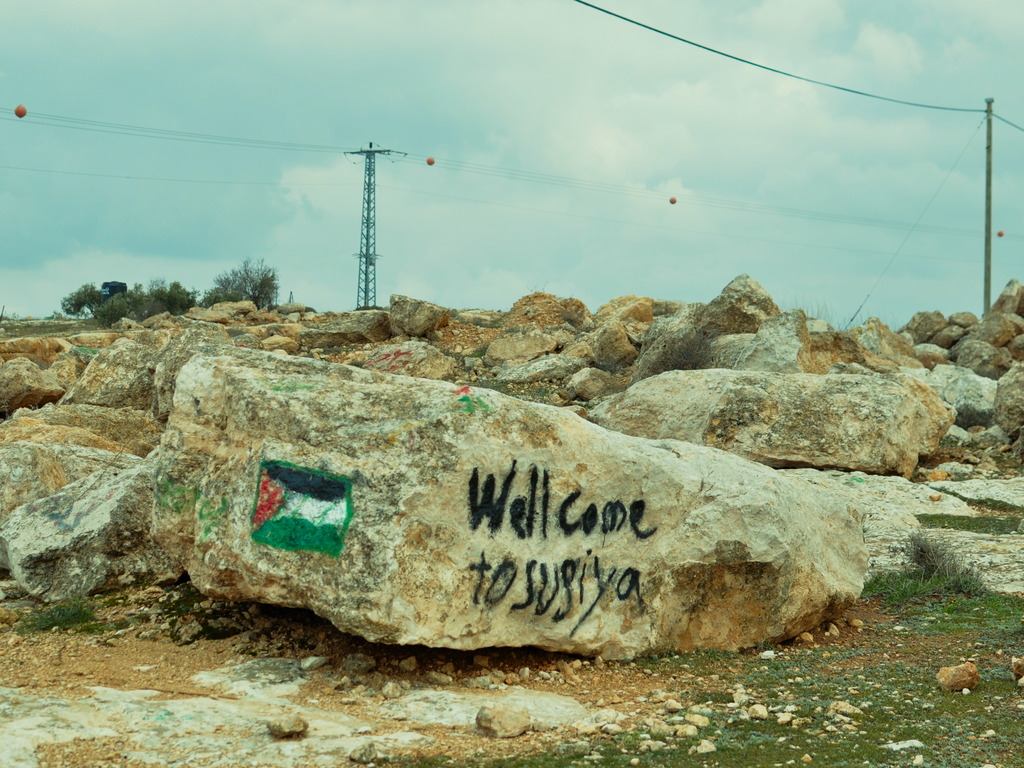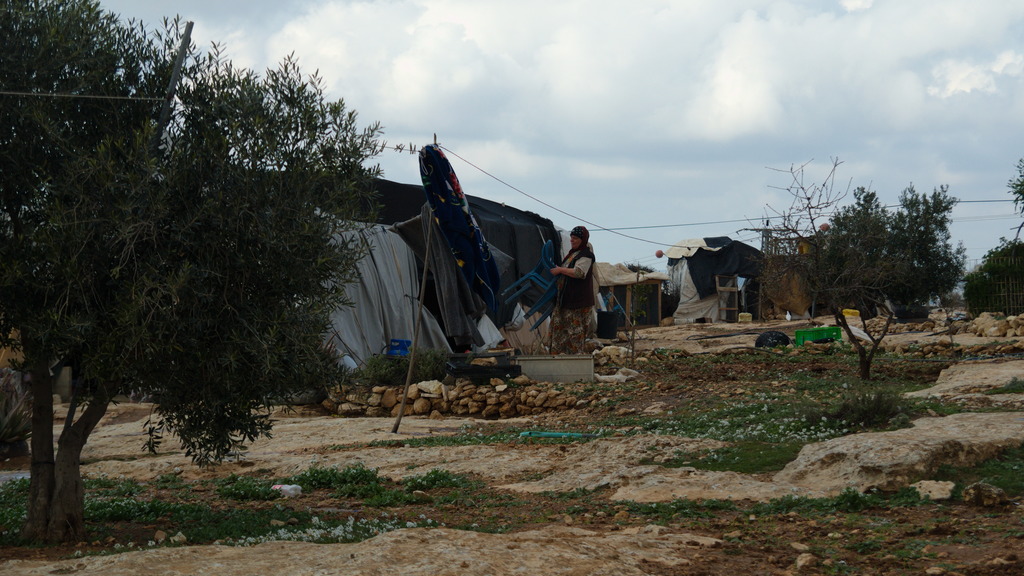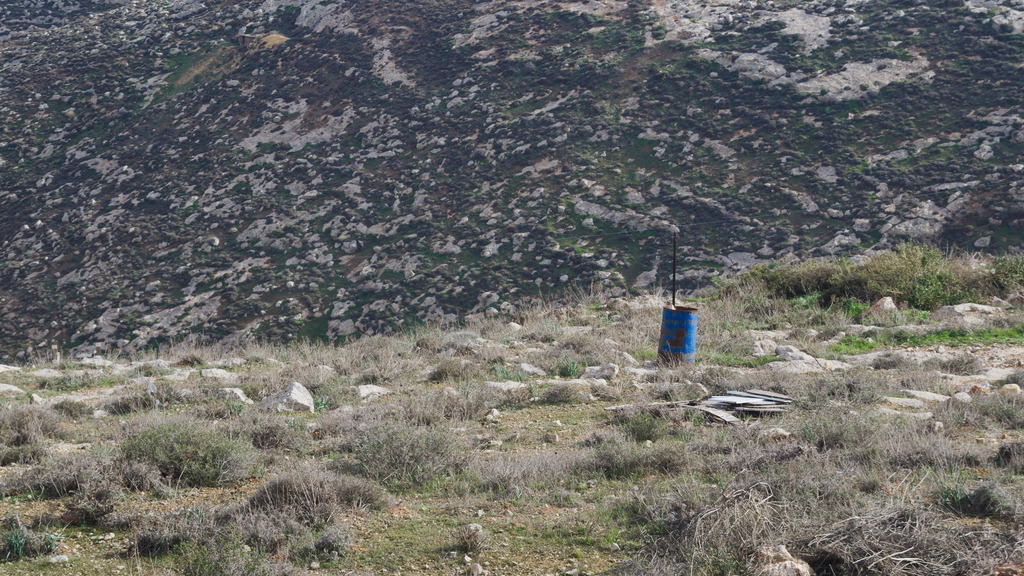Completely razed thrice and parts of the village torn down multiple times, Susiya stands only to face more demolition. Every frail and rickety structure that is a part of Susiya is illegal, each of the structures have demolition orders and if implemented, her people face expulsion.
Residents of Susiya have many stories to tell – from the lack of water and electricity to permits to build homes – every incident comes together to form the bigger story of Susiya and tens of villages like Susiya in the West Bank. To understand why a tiny village with a population of about 400 in a rather remote area of the Southern Hebron Hills is facing demolition orders, one will have to make sense of Israel’s intentions and what Israel does to safeguard her interests.

Water
The problem of access to water here is synonymous to the bigger problem Susiya faces. The village should actually have no problem receiving water. Neighbouring settlements get water though Israeli pipelines from sources nearby. “That is water I have right to,” points out Nasser. In fact, the pipelines that carry water to the settlements pass by Susiya.
Nasser points to water cisterns in the distance that belong to residents of Susiya; these cisterns are out of bounds to them because they lie in the buffer zone between a settlement and the village. “If one of us enters the buffer zone he can be arrested. It is a crime to enter forbidden land,” he says.
With the help of lawyers, Susiya got a permit to access the water cisterns on Monday mornings while the army escorts the villagers. This model does not always work for the villagers. “Sometimes the army says they are busy and on other days when we reach there the settlers swoop down on us as if it is an intervention,” says Nasser. A day’s effort wasted. To collect water from those cisterns villagers hire tractors from the town of Yatta, when the water collection venture does not pan out, it is a great loss these villagers who now not only have to pay for a tractor they did not use but also buy water and transport it to their village.
Finally the villagers wrote to the Civil Administration seeking a plan where they would pay for subsidised water. This plea was disregarded because the village is illegal, so there is no question of supplying water to the village. “We go to find justice but we do not get any.”
It may be interesting to note that one of the Supreme Court justices lives in an Israeli Settlement.
Susiya Masterplan
The wind is not strong when I arrive at the village in early January, but I can picture what it must be like when a strong wind blows. Tents shiver, the tarpaulin quivers to the gusts of the wind as the villagers run into their little tents and pray that this day passes soon because rebuilding is not an option they have. Tents in Susiya have been ruined by wind and rains in the past, yet the villagers cannot rebuild those tents because the Civil Administration did not give them the go ahead.
Between 2007 and 2012 settlers got 8,746 new permits while Palestinians got just 129.
In 2014 the village residents submitted a master plan to the Civil Administration to find a way to legalise their village. The master plan was rejected. The CA said that the master plan did not meet the necessary criteria. “The document that rejected the master plan was one of the most cynical documents I have ever come across in my life. It basically said that it is for the benefit of the residents of Susiya that the village cannot be approved,” says a volunteer from Breaking the Silence. “They want the residents of Susiya to move to Yatta where according to Israel there are better opportunities. Yatta has 40 per cent unemployment!”
Israel has also been known to tell the residents that by living in such poor conditions the residents are neglecting the future of their children and health of the women and elderly. “If they keep tearing down our tents, how are we supposed to live any better?” asks Nasser. “Their plan is for us to move to an area near Yatta, but that village must have been taken away from another village just like mine. How can I go and live there?”
Israel would prefer it if residents of small villages like Susiya moved to bigger cities and towns like Yatta because it will be easier to control them within that city/town. This would not be possible if they were scattered around the West Bank.
Though not to Yatta, some residents of Susiya did leave the village in the fear of the imminent demolition because everyone has a tipping point. Few of them have returned since then, when they noticed that the atmosphere was improving.

Land Acquisition
Nasser and his neighbours do not want to leave Susiya because once they leave, even this land that legally belongs to them will be lost. According to Ottoman Law (Land law in the West Bank is based on amended Ottoman Law), if a piece of agricultural land has not been cultivated for a few years, then that land becomes public land. In addition, if a person plants even a single tree on a piece of land and tends to it for ten years, then he gains control of that land.

The more you learn about what happens in the West Bank, the more puzzling it gets. Get this for instance: Five types of laws are applicable in the West Bank – Military Law, International Law, Jordanian Law, British Law and Ottoman Law.
Nasser sums it all up, “You know, all this is not about what is legal and what is not. That’s just a ploy. They just want us out of here. That’s all they want.”
Once I was talking about equality to someone; why the rules of the game should be the same for everyone. The reply to my arguments was the rather commonplace statement- Life is not same for everyone how can law be? I don’t still know which side of the coin I am on but it seems to me that the laws are extremely disproportionate in these cases. Water? It is one of the most basic necessities of life. How can people be deprived of something so essential! It is not a surprise therefore that there is such a negative image of Israel in the world and why I lost a few friends and respect when I decided to move to this place.
It would be interesting to know more about the official stance of Israel on these matters.
Law has to better than what life can offer us. Right? It is quite unfortunate that anyone would want the rules to reflect our flaws. The laws must be immune to our flaws and beyond us.
With regard to Israel, I guess Israel’s stance is that everything they do is for security. My question then is: Israel’s army is pretty formidable, do they really need a wall to stop terrorism?
In any case, I cannot see how settlements are justified. As for the rest, I really would like to see a justification that holds.
Sadly that can’t be. After laws are not god-sent and law makers shall eventually be inclined towards self interests. This is where it is necessary that the law making body needs to be representative in every possible way. Can this really happen just by itself in a democracy? For instance, just consider women representation in the parliament in India. How would you imagine that women interests can be taken care of? This is precisely why the laws are bound to reflect these flaws; the flaw of being under-represented.
The wall has some justification and so do the settlements, not that I understand the justifications completely. Open boundaries allow people to pass through borders as they like. Walls allow me to inspect everyone going and coming out. Settlements have been justified many times by right-wingers as modes of punishment (some sort of contrived idea that this helps reduce terrorism) and historical claims (that we are after all the people of the land). I guess I shouldn’t speak, as always, from half-baked ideas. I would love to hear the other side speak!